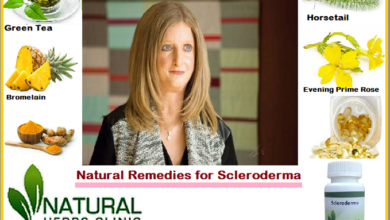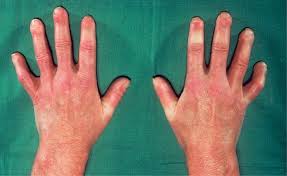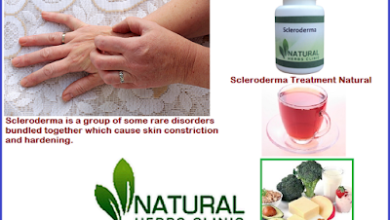Living with Scleroderma? These Treatments Could Be a Game Changer

Scleroderma, also known as systemic sclerosis, is a rare autoimmune condition that affects the skin, connective tissue, and internal organs. Its progression and severity can vary widely between individuals, making it a complex condition to manage. While conventional medicine offers treatments to control symptoms and slow the disease’s progression, a growing number of patients are turning to complementary and alternative therapies to enhance their quality of life. Among these, Herbal Treatment for Scleroderma is gaining popularity for its potential to support immune health, reduce inflammation, and promote overall well-being.
The most promising herbal treatments, supplements, and lifestyle strategies that could be game changers for people living with scleroderma. Whether you’re newly diagnosed or have been managing this condition for years, these insights may offer you new hope and a natural path toward improved health.
Understanding Scleroderma: A Quick Overview
Before diving into treatments, it’s important to understand what scleroderma entails. The name itself means “hard skin,” which reflects one of the hallmark symptoms: thickening and hardening of the skin. However, scleroderma can also affect blood vessels, muscles, and internal organs such as the lungs, kidneys, and heart.
Types of Scleroderma
- Localized Scleroderma:Affects only the skin and sometimes the muscles underneath.
- Systemic Scleroderma:Affects the skin and internal organs. It includes subtypes such as limited cutaneous systemic sclerosis and diffuse cutaneous systemic sclerosis.
Common Symptoms
- Skin thickening and tightness
- Raynaud’s phenomenon (color changes in fingers and toes due to cold or stress)
- Joint pain and stiffness
- Digestive problems
- Fatigue
- Shortness of breath
Scleroderma can be unpredictable. This makes treatment plans highly individualized, often combining medications, physical therapy, and now increasingly, herbal treatment for scleroderma.
Why Consider Herbal Treatments?
Conventional treatments such as immunosuppressants, corticosteroids, and anti-inflammatory drugs can offer relief, but they may come with serious side effects. Herbal therapies present a gentler alternative that may help manage symptoms naturally.
Herbs have been used for centuries in traditional medicine systems like Ayurveda, Traditional Chinese Medicine (TCM), and Western herbalism. They offer a wide range of bioactive compounds that support immune regulation, reduce oxidative stress, and soothe inflammation—all vital for managing autoimmune conditions like scleroderma.
Top Herbal Treatments for Scleroderma
Let’s take a closer look at the most studied and promising herbs and natural remedies for scleroderma.
1. Turmeric (Curcuma longa)
Turmeric contains curcumin, a powerful anti-inflammatory and antioxidant. Studies have shown that curcumin can reduce fibrosis and inflammation, making it a potential ally in the battle against scleroderma.
Benefits:
- Reduces joint pain and stiffness
- Supports liver function
- May slow down fibrosis
How to Use:
- Take 500-1000 mg of standardized curcumin extract daily
- Add turmeric to food or drink as a spice or in golden milk
2. Gotu Kola (Centella asiatica)
Gotu kola is known for its ability to support skin regeneration and improve blood circulation. It’s especially useful for those experiencing skin tightening and poor wound healing.
Benefits:
- Promotes collagen remodeling
- Aids in skin elasticity
- Improves circulation
How to Use:
- Take 300-500 mg extract daily
- Apply topically as an infused oil or cream
3. Ashwagandha (Withania somnifera)
A potent adaptogen, ashwagandha helps balance the immune system and combat stress—both crucial for those with autoimmune conditions.
Benefits:
- Modulates immune function
- Reduces fatigue
- Improves sleep and mood
How to Use:
- Take 600-1000 mg extract daily, preferably with meals
4. Boswellia (Boswellia serrata)
Also known as Indian frankincense, Boswellia is well-regarded for its anti-inflammatory effects and ability to reduce pain and swelling in joints.
Benefits:
- Decreases inflammation
- Improves joint mobility
- Supports lung function
How to Use:
- Standardized extracts (containing 65% boswellic acids) at 300-500 mg, 2-3 times daily
5. Milk Thistle (Silybum marianum)
Liver support is crucial when managing chronic illness, especially if medications are involved. Milk thistle’s active compound, silymarin, helps detoxify and regenerate liver cells.
Benefits:
- Protects the liver from toxins
- Reduces oxidative stress
- May help with gastrointestinal symptoms
How to Use:
- 150-300 mg extract (standardized to 70-80% silymarin) daily
These herbs, when used consistently and under medical guidance, can make a noticeable difference in symptom management. Collectively, they represent a powerful herbal treatment for scleroderma.
The Role of Herbal Supplements
While individual herbs are beneficial, combining them in the right way often yields the best results. That’s where herbal supplement for scleroderma products come into play.
These supplements are usually formulated to address the multiple dimensions of scleroderma, such as inflammation, immune imbalance, and organ support. A high-quality herbal supplement will typically include:
- Anti-inflammatory herbs (like turmeric and Boswellia)
- Adaptogens (like ashwagandha and Rhodiola)
- Antioxidants (like milk thistle and green tea)
- Circulatory enhancers (like ginger and ginkgo)
Choosing the Right Supplement
When selecting an herbal supplement for scleroderma, keep the following in mind:
- Standardized extracts:Ensure consistent potency
- Purity:Look for third-party testing and non-GMO certification
- Dosage:Choose clinically supported dosages
- Reputation:Trust brands with strong ethical and safety records
Consult your healthcare provider before starting any supplement, especially if you’re taking prescription medication.
Complementary Therapies That Enhance Herbal Treatments
Herbs are powerful, but they work even better when combined with other supportive therapies. Here are some additional approaches to consider:
1. Anti-Inflammatory Diet
Eating clean can have a huge impact on autoimmune conditions. Focus on:
- Fresh vegetables and fruits
- Omega-3-rich foods (like flaxseed, chia, wild-caught fish)
- Gluten-free grains (quinoa, brown rice)
- Avoiding processed foods, sugar, and dairy
This kind of diet supports the work of any herbal treatment for scleroderma by lowering baseline inflammation and improving gut health.
2. Regular Exercise
Gentle movement helps maintain flexibility, reduce stiffness, and improve circulation. Consider:
- Yoga
- Tai chi
- Water aerobics
- Daily walking
Even 20 minutes a day can make a difference in energy and mobility.
3. Stress Reduction Techniques
Chronic stress can worsen autoimmune flare-ups. Tools that can help include:
- Meditation
- Deep breathing
- Journaling
- Art therapy
- Cognitive-behavioral therapy (CBT)
Combining these with herbal supplement for scleroderma may help balance the nervous system and enhance immune resilience.
Real-Life Success Stories
Many scleroderma warriors have turned to herbal and natural treatments after conventional medicine offered limited relief. Here are just a few inspiring stories:
Jenna, 38 – From Fatigue to Flourishing
Jenna was diagnosed with systemic scleroderma at 32. She struggled with joint pain, fatigue, and digestive issues. After introducing turmeric, ashwagandha, and an herbal supplement for scleroderma into her routine—along with yoga and an anti-inflammatory diet—she began to notice improvements within three months.
“I still have bad days, but now I have way more good days. My energy is better, my digestion is under control, and my joints don’t ache like before.”
Marcus, 45 – Regaining Control Naturally
Marcus had been on immunosuppressants for five years. Tired of the side effects, he gradually transitioned to a protocol involving milk thistle, Boswellia, and lifestyle changes.
“Herbs helped me get off two medications and gave me my life back. I never thought I’d be hiking again, but here I am.”
Are Herbal Treatments Right for You?
It’s important to remember that herbal treatment for scleroderma is not a cure—but it can be a valuable part of a holistic care plan. If you’re considering this path, here are some tips to get started:
- Work with a naturopath or integrative doctor
- Start slowly, introducing one herb or supplement at a time
- Track your symptoms and progressin a journal
- Be patient—natural healing takes time
Combining herbs with conventional care may offer the best outcomes. Think of it not as either/or—but as a “both/and” approach to healing.
Conclusion: Hope Through Herbal Healing
Living with scleroderma presents daily challenges, but the rise of holistic and natural therapies offers new hope. From turmeric’s inflammation-busting power to ashwagandha’s stress-soothing effects, herbal treatment for scleroderma can support healing from the inside out. And with the right herbal supplement for scleroderma, you may experience real relief, improved function, and a renewed sense of control over your health.
Always consult your healthcare provider before beginning any new treatment plan, and remember—every step you take toward natural healing is a step toward a better, more empowered life.



